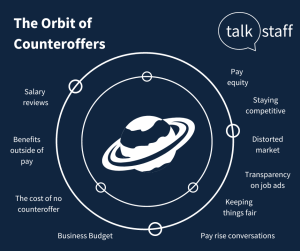How to handle a counteroffer – As an employer
- August 18, 2023
- Posted by: Hannah Ingram
- Category: Pay, Reward & Benefits

Tackling Counteroffers to Retain Your Staff
40% of UK employers have made a counteroffer in the past 12 months and this is only looking to grow, as employee retention challenges continue to plague many organisations.
What’s more, in a recent study, 35% of UK staff are changing jobs for better pay and benefits


Why are employees moving on for more money?
Employees are dealing with the ongoing effects of the cost-of-living crisis, and this means to maintain their existing lifestyles and provide for their families they are looking elsewhere.
Many employees have taken on extra responsibilities since the pandemic meaning they have acquired skills such as management or technical knowledge that they can use as leverage for career progression.
Their existing employees may not have fully compensated them, through a pay rise or promotion, for these extra skills gained and the associated responsibilities.
The rise of remote and hybrid working has also opened doors as people are less restricted to localised jobs.
The effect on struggling businesses.
At the same time many businesses are struggling with rising costs and inflation too, some of which are still reeling from the effects of the pandemic and other recent events.
Unfortunately, this is leading to businesses losing their top talent due to not proactively carrying out salary reviews, more on this later.
The pay rise conversation
There are two scenarios where employees are looking to move on for more money.
Scenario 1: They ask for more money
Many businesses are avoiding pay increases leading to employees looking elsewhere.
When employers say no to a pay rise, whether for the right or wrong reasons, this can lead to feeling of resentment for the employee.
If they feel under-appreciated they are more likely to form a stronger attachment to a new job opportunity.
Many businesses are only budging when presented with a solid offer from a competing company and sometimes this is too late to successfully counteroffer.
Scenario 2: They don’t ask
Not everyone wants to have an uncomfortable pay rise conversation due to fear of rejection, wanting to have a back-up in place or if they struggle with assertiveness. So, you may not be aware that there is a problem.
In conclusion, biding your time hoping your top talent won’t leave is not a good plan. It’s best to have a plan in place of how to handle these situations and where possible to avoid them in the first place.


How to handle a counteroffer situation as an employer
Counteroffer decisions need to be made quickly so make sure you plan ahead for these considerations.
Consider this:
An employee walks into your office and blindsides you, they have a job offer on the table from another company
1. The cost of no counteroffer
Paying someone more money not to leave costs money, but so does rehiring. When you lose a team member you lose organisational knowledge, technical skillsets and their relationships with clients.
What’s more tacit knowledge, acquired over time, is something you can’t get back once someone has left.
Hiring can be costly including recruitment services and training, not to mention the valuable time lost by getting people up to speed.
What’s more it can be hard to recruit at the moment with skills shortages in several sectors, and it’s likely that, to hire a replacement you may have to offer the same or more money that your employee is asking for anyway.
2. Is your employee going to stay for long?
Think hard about why your employee is really leaving. If it’s just money then a counteroffer can be the solution for a passionate, hard-working employee.
However, if they were already showing signs of being demotivated, bored of their role, or complaining of long commutes then these are unlikely to change; they may in fact choose to leave for good in the next few months.
This means all those costs of hiring and lost time will happen anyway, just later. So, weigh up if it makes more sense for both parties to part on good terms now.
3. Weigh up the employer’s contribution to the business
Assess what the employee brings to the business. Just because they can get a job paying 15K more a year doesn’t mean it makes sense for your budget to pay them 15K more.
Just because someone is a great worker doesn’t mean the position warrants a huge increase.


4. The ripple effect on the team
Be careful with counteroffers to keep a sense of fairness across the business. It’s one thing if one member of staff is being underpaid (in which case the question to ask is why they have been unpaid compared to others?).
But if they are at a similar level and job title to other team members this can lead to a ripple effect with other teammates repeating the cycle. It’s unlikely what happens will stay a secret.
This can also cause resentment in the team if they feel someone is being treated favourably which can effect productivity and the ability for teams to work well together.
Consider how you’ll keep things fair and make your team members feel valued and well compensated for their role.
5. Pay equality
Another consideration is whether other members of the team could bring equal pay claims for being treated unfairly. The lack of a formal process and data analysis can result in equal pay challenges.

The external implications of counteroffer culture
Staying competitive through regular salary reviews
Companies who have been putting off salary increases since the pandemic will be experiencing the impact of not doing so. Businesses are under a lot of financial pressure.
However, by not doing regular salary reviews the gap starts growing making it harder to fix later on.
The past few years have distorted the market meaning that employees cannot assume they are on a level playing field with their competitors when it comes to attracting and retaining top talent.
The rise in transparency
Much like internal salaries, there’s considerable inconsistency in pay externally and job ads, whilst on the positive are mostly now showing salaries, vary considerably from employer to employer.
Investing in your team
Paying everyone a higher salary may not be feasible but are you doing enough to stop them leaving?
There are progressive techniques such as 4-day working weeks or these 9 alternatives.
What’s more you can invest in your team through technical skills, team building and organisational development. Not everything is about money.
Help with counteroffer culture or rehiring
If you want to explore a people strategy that includes counteroffer considerations, you need help hiring great team members after losing great teammates, or you need HR support to mitigate internal conflict then reach out to our friendly team.
Last Updated on 11 months by Hannah Ingram





